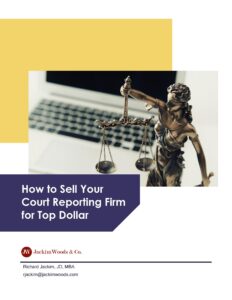
An Innovative Approach to Business Brokerage and M&A Fees
Working with a business broker or M&A advisor can significantly enhance your results when selling your business. At our firm, we recognize the distinct needs of each client and offer an innovative alternative to the conventional business broker fee structure. In addition to the traditional full-service commission or success-fee model, Jackim Woods & Co provides clients with the option to engage us as consultants and pay on an hourly basis, offering a more personalized approach tailored to your requirements.
Our innovative hourly billing option allows you to access our expert services as needed, ensuring you only pay for the specific assistance you need, resulting in significant cost savings. Regardless of the fee model chosen, we are committed to providing exceptional services and outcomes aligned with your unique objectives.
Deciding Between Fee Structures
Success-Fee Basis
PROS:
- Aligned Interests: Our fee is contingent upon the successful sale, aligning our interests with yours and motivating us to get the highest price for you.
- Minimal Upfront Costs: With only a small retainer upfront, you can minimize initial expenses.
- Confidence in Broker’s Ability: Our willingness to work on a success-fee basis reflects our confidence our ability to sell your business.
- Risk Mitigation: If the deal falls through, you incur no financial obligation other than the initial retainer, thereby reducing your financial risk.
CONS:
- Higher Overall Cost: The success fee, a percentage of the sale price, will usually result in higher costs compared to hourly billing.
- Focus on Larger Deals: Brokers may prioritize larger deals due to their compensation being tied to deal size.
- Possible Rush to Close: There’s a risk of prioritizing closing the deal over negotiating optimal terms for you.
Hourly Basis
PROS:
- Cost Control: Hourly billing offers predictability and manageability, especially for smaller transactions or prolonged processes, ensuring you pay only for the services you need.
- Flexibility: You can tailor our services to your needs, from brief consultations to having us run a comprehensive sell-side process for you.
- Objective Advice: Our fee structure ensures impartial advice focused on your best interests rather than simply closing the deal.
- Transparency: Transparent billing simplifies expense tracking and comprehension.
CONS:
- Upfront and Ongoing Costs: The hourly fee is due whether the deal closes or not, so the cost to you may be higher than the initial retainer under the success fee based approach.
- Less Incentive to Close Quickly: Because we are solely focused on providing you with impartial, objective advice, it could potentially prolonging the process.
Case Study
Recently, we assisted the owner of a medium-sized court reporting firm in California. With a business valued at $1M, she sought our expertise in navigating a sale. She had already been approached by several buyers, so she just needed our help determining what her firm was worth, analyzing each buyer’s offer, providing assistance in negotiations and counterproposals, and help responding to the buyer’s due diligence requests. Since she didn’t need us to run a full sell-side process, the consulting model was ideal for her. Typically, brokers charge an 8-10% success fee, translating to $80,000 in this case. Opting for our hourly consulting model, she saved a substantial amount. With 40 hours of consulting time spent, including valuation, negotiation, and due diligence assistance, her total fee amounted to $15,800, saving her $64,200 compared to the traditional business broker commission model.
Conclusion
Recognizing the uniqueness of each client’s needs, we offer both traditional commission and consulting fee models. Whether engaged using a success-fee arrangement or hourly billing, our commitment remains steadfast to providing top-tier service tailored to your objectives.
About the Author and Jackim Woods & Co
 Rich Jackim is an attorney, investment banker, and entrepreneur. For the last 25 years, Rich has been providing boutique investment banking services to small and middle-market companies in over 30 industries.
Rich Jackim is an attorney, investment banker, and entrepreneur. For the last 25 years, Rich has been providing boutique investment banking services to small and middle-market companies in over 30 industries.
In addition to running a successful M&A advisory firm, Rich founded a successful training and certification company called the Exit Planning Institute, which he sold to a private family office in 2012.
Rich is also the author of the critically acclaimed book, The $10 Trillion Dollar Opportunity: Designing Successful Exit Strategies for Middle Market Businesses. It became an Amazon best-seller in the business consulting category the year it was published.
If you own a business and are interested in exploring your options, I would welcome an opportunity to speak with you. There is no cost or obligation to you and all discussions are completely confidential.
Feel free to contact me at 224-513-5142 or rjackim@jackimwoods.com.
Read More
Acquisitions in the Court Reporting & Litigation Support Sector
This article provides a summary of mergers and acquisitions transactions in the Legal Services Support Sector between 2018 and 2024. We try to update this post every month as we close more deals and learn of other deals that have closed in the sector.
An Overview of the Court Reporting and Litigation Support Sector
The Litigation Support Services or Legal Services Support sector includes a wide range of companies that provide specialized services to legal professionals and organizations. Some of the types of companies in the sector include:
Court Reporting Firms: These companies provide skilled court reporters to create verbatim records of legal proceedings, depositions, and hearings.
Litigation Support Providers: These firms offer a wide range of services to assist with litigation, including eDiscovery, document management, trial preparation, and case management.
Legal Technology Companies: These companies develop and provide software solutions tailored to the needs of legal professionals, such as case management software, document review platforms, and legal research tools.
Legal Research and Publishing Companies: These entities produce and distribute legal research materials, including case law, statutes, regulations, and legal commentary.
Legal Consulting Firms: These firms offer strategic advice and consulting services to law firms, corporate legal departments, and other legal entities on various aspects of legal practice, including practice management, technology adoption, business development, trial preparation, jury selection, etc.
Videography Services: These companies specialize in recording video and audio records of legal proceedings, depositions, and interviews and converting them into written transcripts.
Forensic Accounting and Investigation Firms: These firms provide financial and investigative services to support litigation, including forensic accounting, fraud investigation, asset tracing, and expert witness testimony.
Legal Staffing and Recruitment Agencies: These firms specialize in placing legal professionals, including attorneys, paralegals, legal secretaries, and support staff, with law firms, corporate legal departments, and government agencies.
Legal Process Outsourcing (LPO) Companies: These organizations offer outsourced legal services to law firms and corporations, including document review, contract drafting, intellectual property management, and legal research. This subsector is going through rapid change as artificial intelligence solutions become more integrated in their offerings.
Court Technology and Services Providers: These companies develop and implement technology solutions for courtrooms and legal proceedings, such as electronic filing systems, court management software, and audiovisual equipment for trials and hearings.
Mediation and Arbitration Services: These organizations facilitate alternative dispute resolution processes, including mediation and arbitration, to help parties resolve legal disputes outside of traditional litigation.
Legal Education and Training Providers: These entities offer continuing legal education (CLE) programs, professional development courses, and training seminars for legal professionals to enhance their skills and knowledge in various areas of law and practice.
Court Reporting and Litigation Support Services Consolidation
The legal and litigation support sector is experiencing a long-term consolidation by several large national players and about a dozen smaller regional companies.
Here is a summary of the factors driving this long-term consolidation.
- Professional Shortage: There’s a notable shortage of skilled court reporters, partly due to an aging workforce and fewer new entrants in the field. Larger firms, through consolidation, can better manage this talent crunch by pooling resources and offering more attractive career paths.
- Technological Advancements: The court reporting industry, like many others, is rapidly evolving due to technology. Advancements in digital recording, real-time transcription, and even AI-powered transcription services are reshaping the landscape. Firms are consolidating to better invest in and leverage these technologies. It’s a bit like the tech trends we see in other sectors, where staying ahead of the curve is crucial.
- Increasing Demand for Legal Services: There’s a growing demand for legal services, partly due to increased regulatory complexities and a more litigious society. This demand extends to court reporting services, which are essential for legal proceedings. Larger firms, through consolidation, can handle a higher volume of work more efficiently.
- Economies of Scale: By consolidating, court reporting firms can achieve economies of scale. This means they can offer services at a lower cost while improving quality. It’s a classic business move – think of it like big tech firms merging to streamline their operations and cut down on expenses.
- Market Fragmentation: The court reporting industry is pretty fragmented, with many small players. This fragmentation makes it ripe for consolidation, as larger firms can acquire smaller ones to expand their market share and client base.
- Diversification of Services: The large national court reporting firms are diversifying their services to include things like legal videography, translation, litigation consulting, eDiscovery, and document management services. By consolidating, firms can offer a broader range of services to their clients, making them a one-stop shop for legal support services.
- Client Expectations: Clients are increasingly expecting more comprehensive and sophisticated services. Larger, consolidated firms are often better equipped to meet these expectations with their broader range of services and technological capabilities.
Due to these long-term factors, we anticipate this consolidation to continue for the foreseeable future.
Mergers and Acquisitions in the Court Reporting and Litigation Support Industry
The following section outlines a comprehensive summary of mergers and acquisitions transactions within the legal and litigation support services sector spanning the period from 2018 to 2024. This curated list is updated on a monthly basis to reflect the latest developments and transitions within the industry.
| Buyer | Seller | Date | Subsector |
| A Strategic Buyer | The College of Court Reporting | 6/28/2024 | Court Reporting Training |
| DepoLink Court Reporting | Robert Cirillo, Inc. | 6/5/2024 | Court Reporting |
| Lexitas | LawGistic Partners | 5/8/2024 | Service Process & Delivery |
| Veritext Legal Solutions | Anderson Reporting | 5/1/2024 | Court Reporting |
| U.S. Legal Support Inc. | Wendy Ward Roberts & Associates | 4/30/2024 | Court Reporting |
| Veritext Legal Solutions | Twin West Reporting | 4/16/2024 | Court Reporting |
| Veritext Legal Solutions | L.A. Court Reporters | 4/16/2024 | Court Reporting |
| Veritext Legal Solutions | Iseminger & Associates | 4/16/2024 | Court Reporting |
| Veritext Legal Solutions | Cavalier Reporting | 4/16/2024 | Court Reporting |
| Lexitas | Kopy Kat | 4/1/2024 | Record retrieval & copy services |
| Magna Legal Services | Jones & Fuller Court Reporting | 2/21/2024 | Court Reporting |
| Lexitas | Medical Legal Reproductions | 2/14/2024 | Record retrieval & copy services |
| Array | Alliance Imaging, LLC | 2/6/2024 | eDiscovery, Data Management |
| Veritext | Dianne Jones & Associates | 1/31/2024 | Court Reporting |
| Aptus Court Reporting | Sheri Bell Reporting | 1/30/2024 | Court Reporting |
| Complete Legal | Frontline Managed Service’s eDiscovery unit | 1/23/2024 | eDiscovery, Data Management |
| Magna Legal Services | Zanaras Reporting & Video | 12/7/2023 | Court Reporting |
| Osano | WireWheel | 12/15/2023 | Compliance solutions |
| Esquire | Hill & Romero Court Reporters | 12/15/2023 | Court Reporting |
| Cristina and Jerry Coash Jr. | Coash Court Reporting & Video | 11/30/2023 | Court Reporting |
| Lexitas | Evolution Process Service | 11/21/2023 | Process server |
| Exterro | Divebell | 11/1/2023 | eDiscovery |
| Wolters Kluwer | MFAS | 10/31/2023 | Tax Content |
| Veritext Legal Solutions | Metropolitan Court Reporters | 10/14/2023 | Court Reporting |
| Veritext Legal Solutions | Wasileski Court Reporting | 9/28/2023 | Court Reporting |
| Lexitas | Esquire Assist | 9/26/2023 | Corporate Filing/Registered Agent |
| Lexitas | AAAgent Services | 9/26/2023 | Corporate Filing/Registered Agent |
| Veritext Legal Solutions | Atchison & Denman | 9/14/2023 | Court Reporting |
| U.S. Legal Support | TrialEx Legal Graphics & Trail Consulting | 8/21/2023 | Litigation Consulting |
| Veritext Legal Solutions | M&M Court Reporting | 6/25/2023 | Court Reporting |
| U.S. Legal Support Inc. | Summit Court Reporting | 6/23/2023 | Court Reporting |
| Lexitas | Imagine Reporting | 6/20/2023 | Court Reporting |
| Veritext Legal Solutions | Litigation Services | 4/28/2023 | Court Reporting |
| Veritext Legal Solutions | Augusta Scribes | 4/6/2023 | Court Reporting |
| Lexitas | Elite-Brentwood Reporting | 3/21/2023 | Court Reporting |
| Lexitas | Enright Court Reporting | 3/7/2023 | Court Reporting |
| Veritext Legal Solutions | Garcia McCall Court Reporters | 3/3/2023 | Court Reporting |
| Veritext Legal Solutions | Bridges Court Reporting | 2/1/2023 | Court Reporting |
| Lexitas | Kusar Court Reporters | 1/31/2023 | Court Reporting |
| Lexitas | HIQ | 1/17/2023 | UCC & Lien Search |
| Lexitas | TRAC | 1/17/2023 | Corporate Filing/Registered Agent |
| Array | Compass Reporting | 12/31/2022 | Court Reporting |
| Lexitas | TaylorMorse Record Retrieval | 12/21/2022 | Data management |
| Veritext Legal Solutions | Mainland Reporting | 12/20/2022 | Court Reporting |
| Veritext Legal Solutions | Hart Reporting | 12/16/2022 | Court Reporting |
| Lexitas | AdvancedONE | 11/30/2022 | Court Reporting |
| Lexitas | Depo International | 11/8/2022 | Court Reporting |
| Lexitas | Oasis Reporting Services | 10/19/2022 | Court Reporting |
| Magna Legal Services | Barkley Court Reporters | 10/12/2022 | Court Reporting |
| Lexitas | Grove & Associates | 10/4/2022 | Court Reporting |
| Lexitas | Allstate Corporate Services | 9/23/2022 | Corporate Filing/Registered Agent |
| Stewart Richardson Deposition Services | Seidel & Sasse Court Reporters | 9/19/2022 | Court Reporting |
| Veritext Legal Solutions | Parise & Associates | 9/9/2022 | Court Reporting |
| Veritext Legal Solutions | Anthem Reporting | 9/9/2022 | Court Reporting |
| Veritext Legal Solutions | Paul Baca | 9/9/2022 | Court Reporting |
| LITIGATION SERVICES (Veritext) | Central Court Reporting & Video | 8/22/2022 | Court Reporting |
| Lexitas | Phipps Reporting | 7/19/2022 | Court Reporting |
| Esquire Deposition Solutions | TSG Reporting, Inc. | 7/13/2022 | Court Reporting |
| Veritext Legal Solutions | Doris Wong | 6/23/2022 | Court Reporting |
| Veritext Legal Solutions | Advanced Reporting Solutions | 6/13/2022 | Court Reporting |
| Lexitas | Yorkson Legal Staffing | 6/1/2022 | Court Reporting |
| Veritext Legal Solutions | Associated Reporting & Video | 5/16/2022 | Court Reporting |
| Veritext Legal Solutions | Richards Court Reporting | 4/4/2022 | Court Reporting |
| Veritext Legal Solutions | Musetta & Associates | 3/28/2022 | Court Reporting |
| Veritext Legal Solutions | Cady Reporting | 3/28/2022 | Court Reporting |
| U.S. Legal Support | Baton Rouge Court Reporters | 3/21/2022 | Court Reporting |
| Veritext Legal Solutions | Court Reporters of Louisiana | 3/21/2022 | Court Reporting |
| Empire Technologies Risk Management | L2 Services | 8-Mar-22 | Digital Scanning |
| Lexitas | Strehlow Court Reporting | 2/22/2022 | Court Reporting |
| LITIGATION SERVICES (Veritext) | Merit Court Reporting | 12/27/2021 | Court Reporting |
| Esquire | Willette Court Reporting | 7/13/2021 | Court Reporting |
| Veritext Legal Solutions | Brown & Jones Reporting | 6/2/2021 | Court Reporting |
| Brooks Court Reporting, Inc. | Cleeton Davis Court Reporters | 5/1/2021 | Court Reporting |
| Aptus Court Reporting | The Best Evidence, Inc. | 1/24/2020 | Court Reporting |
| LITIGATION SERVICES (Veritext) | Verbatim Reporting Service | 1/14/2020 | Court Reporting |
| U.S. Legal Support | DecisionQuest Trial Consulting | 10/1/2019 | Litigation Consulting |
| U.S. Legal Support | Litivate Reporting & Trial Services | 9/10/2019 | Court Reporting |
| Regal Court Reporting | Kelli Norden and Associates (KNA) | 6/11/2019 | Court Reporting |
| LITIGATION SERVICES (Veritext) | Kim Thayer & Associates | 6/3/2019 | Court Reporting |
| U.S. Legal Support | Hunter + Geist, Inc. | 5/1/2019 | Court Reporting |
| Veritext Legal Solutions | Epiq | 3/27/2019 | Court Reporting |
| Huseby | Discovery Litigation Services | 3/12/2019 | Court Reporting |
| LITIGATION SERVICES (Veritext) | Superior Court Reporting | 9/5/2018 | Court Reporting |
| LITIGATION SERVICES (Veritext) | Keleher’s | 7/3/2018 | Court Reporting |
| LITIGATION SERVICES (Veritext) | Cameo Reporting | 5/30/2018 | Court Reporting |
In addition to the publicly announced transactions mentioned above, we estimated that several dozen additional transactions take place each year involving smaller court reporting, eDiscovery, and legal support service companies. These smaller transactions are often not formally announced through press releases, but contribute greatly to the dynamic landscape of industry consolidation.
Other Relevant Articles Related to Court Reporting:
Readers may also benefit from exploring our related articles regarding the court reporting and litigation support services sector, including:
Court Reporting & Litigation Support Industry is Ripe for Consolidation
What’s My Court Reporting Firm Worth? – Simple Rules of Thumb updated for 2023
White Paper – The Ultimate Guide to Selling Your Court Reporting Firm for Top Dollar
Jackim Woods’ Court Reporting Practice Group
About the Author and Jackim Woods & Co.
 Rich Jackim is an attorney, investment banker, and entrepreneur. For the last 25 years, Rich has been providing boutique investment banking services to small and middle-market companies in the court reporting and litigation support sector.
Rich Jackim is an attorney, investment banker, and entrepreneur. For the last 25 years, Rich has been providing boutique investment banking services to small and middle-market companies in the court reporting and litigation support sector.
In addition to running a successful M&A advisory firm, Rich founded a successful training and certification company called the Exit Planning Institute, which he sold to a private family office in 2012.
Rich is also the author of the critically acclaimed book, The $10 Trillion Dollar Opportunity: Designing Successful Exit Strategies for Middle Market Businesses. It became an Amazon best-seller in the business consulting category the year it was published.
Jackim Woods & Co offers skilled mergers and acquisitions advisory services to court reporting firms, digital reporting and videography firms, court reporting schools, eDiscovery companies, and legal contract staffing companies in both sell-side and buy-side transactions. Jackim Woods & Co has arranged over 100 successful transactions, ranging in value from less than one million to more than eighty million dollars.
If you own an court reporting firm, legal support services business, or litigation support company and are interested in exploring your options, I would welcome an opportunity to speak with you. There is no cost or obligation to you and all discussions are completely confidential.
Feel free to contact me at 224-513-5142 or rjackim@jackimwoods.com.
Read More
How To Guide to Selling Your Court Reporting Firm for Top Dollar
I’m pleased to announce that I just published a free 17-page guide to Selling your Court Reporting Firm for Top Dollar. This comprehensive guide provides a lot of useful information as you begin to think about selling your court reporting firm, so I thought it would be helpful to provide an outline of the topics covered.
The Ultimate Guide to Selling Your Court Reporting Firm for Top Dollar

Introduction
- Overview of the complexities and rewards of selling a court reporting firm.
- Importance of understanding the sale process and strategizing your exit for a profitable transition.
Understanding the Value of Your Court Reporting Firm
- Critical first step: Determine your firm’s fair market value.
- Unique and valuable aspects of your business in the marketplace.
- Importance of working with an experienced business broker in the court reporting sector.
Key Non-Financial Factors Affecting Firm Value
- Client Base:
- A diverse and loyal client base as a primary asset and value driver.
- Contractors/Reporters:
- The significance of the experience and tenure of court reporters or contractors.
- Technology:
- Adoption of cutting-edge technologies as a value enhancer.
- Administrative Staff:
- The expertise and experience of administrative staff in maintaining service quality.
Valuation Rules of Thumb
- The role of EBITDA and SDE in business valuation.
- Importance of accounting for unique value drivers and detractors for accurate valuation.
The Sales Process
- Steps and timeline for selling a court reporting firm.
- Importance of preparation for a smooth and successful sale.
Preparing Your Firm for Sale
- Financial statement organization and operational process documentation.
- Emphasizing the necessity of up-to-date accounting and efficient operational processes.
Marketing Your Court Reporting Firm
- The need for creating a compelling offering package and contacting potential buyers.
- Utilizing digital marketing and leveraging the expertise of business brokers.
The Role of Professional Advisors
- Advantages of working with a business broker specialized in court reporting firms.
- Mitigating risks such as low-ball offers, due diligence failures, and distractions during the sales process.
Navigating Negotiations
- Understanding buyer motivations and maintaining flexibility.
- The importance of negotiating with multiple buyers simultaneously to secure the best deal.
Choosing the Right Buyer
- Balancing financial offers with cultural and operational fit.
- Evaluating different types of buyers: big box firms, regional firms, and individual entrepreneurs.
The Closing Process
- Steps involved in closing the sale, including due diligence and finalizing financial terms.
- The significance of definitive legal documents at closing.
Embracing the Future Post-Sale
- The emotional and practical aspects of life after selling your business.
- Opportunities for new ventures and personal growth.
Conclusion
- Summarizing the journey of selling a court reporting firm.
- Encouragement to contact a professional advisor for guidance and valuation.
Download Your Copy Here
Download your free copy of this useful white paper here.
About the Author and Jackim Woods & Co.
 Rich Jackim is an attorney, investment banker, and entrepreneur. For the last 25 years, Rich has been providing boutique investment banking services to small and middle-market companies in the court reporting and litigation support sector.
Rich Jackim is an attorney, investment banker, and entrepreneur. For the last 25 years, Rich has been providing boutique investment banking services to small and middle-market companies in the court reporting and litigation support sector.
In addition to running a successful M&A advisory firm, Rich founded a successful training and certification company called the Exit Planning Institute, which he sold to a private family office in 2012.
Rich is also the author of the critically acclaimed book, The $10 Trillion Dollar Opportunity: Designing Successful Exit Strategies for Middle Market Businesses. It became an Amazon best-seller in the business consulting category the year it was published.
Jackim Woods & Co offers skilled mergers and acquisitions advisory services to court reporting firms, digital reporting and videography firms, court reporting schools, eDiscovery companies, and legal contract staffing companies in both sell-side and buy-side transactions. Jackim Woods & Co has arranged over 100 successful transactions, ranging in value from less than one million to more than eighty million dollars.
If you own an court reporting firm or litigation support company and are interested in exploring your options, I would welcome an opportunity to speak with you. There is no cost or obligation to you and all discussions are completely confidential.
Feel free to contact me at 224-513-5142 or rjackim@jackimwoods.com.
Read More
It’s Time to Exit. Are you Ready?

Thinking about whether or not you are ready to exit is an important question. It’s something that every business owner will have to address at some point. Importantly, you don’t want to wait until the 11th hour to prepare to sell your business. There are far too many pieces in this particular puzzle to wait until the last minute. You’ll want to begin the process sooner by asking yourself some key questions.
Determining Value
First, you’ll need to determine the actual value of your business. It is a harsh truth, but what you think your business is worth and what the market feels that it is worth may be two very different things.
This point serves to underscore the importance of working with a business broker or M&A advisor early in the process. An experienced broker knows how to go about determining a price that will generate interest and seem fair. Remember that at the end of the day, it will be the marketplace that determines the value of your business, but working with a seasoned professional is an excellent way to match your offering price with what the market will ultimately bear.
Going Within
Secondly, you’ll want to consider whether or not you truly want to sell. It is not uncommon for business owners to begin the process of selling their business only to realize a few hard facts. Wanting to sell and the time being right to sell are often two different things.
Upon placing your business on the market for sale, you may learn that you’re not emotionally or financially ready. If this happens to you, consider it a learning experience that will serve you well down the line.
Get Your Ducks in a Row
If you have done a financial assessment, a little soul searching and have begun working with a business broker or M&A advisor to determine that now is a good time to sell your business, then there are several steps you’ll need to take. You can be sure that any serious prospective buyer will want a good deal of information regarding your company.
At the top of the list of items potential buyers will want to see are three years of profit and loss statements as well as federal income tax returns for the business. Other important documents ranging from lease and lease related documents, lists of loans against the business and a copy of a franchise agreement, when applicable, are all additional documents that you will need to provide. You should also have a list of fixtures and equipment, copies of equipment leases, lists of fixtures and equipment, and an approximate amount of inventory on hand. A failure to not have this information organized and ready to present at a moment’s notice could be a costly mistake.
Working with professionals, such as accountants, lawyers, and brokers, is a savvy move. Owning and operating a business can be a complex process, and the same holds true for selling a business. Investing the time to seek out experienced and professional advice is the first step in selling your business.

Determining the Right Time to Sell

Determining when it’s finally the right time to sell can be a tricky proposition. If you are thinking about selling your business, one of the best steps you can take is to contact a business broker. A good business broker will have years, or even decades, of proven experience under his or her belt. He or she will be able to guide you through the process of determining what you need to do in order to get your business ready to sell.
One major reason you should contact a business broker long before you think you might want to sell is that you never know when the right time to sell may arise. Market forces may change, unexpected events like a large competitor entering your area, or a range of other factors could all lead you to the conclusion that now, and not later, is the time to sell.
In a recent The Tokenist article, “When is the Best Time to Sell a Business?”, author Tim Fries covers a variety of factors in determining when is the best time to sell. At the top of Fries’ list is growth. If your company can demonstrate a consistent history of growth, that is a good thing. Or as Fries phrases it, “What never varies, however, is the fact that growth is a key component, buyers will look for.” Growth will be the shield by which you justify your price when you place your business on the market.
If your business is experiencing significant growth then you have a very strong indicator that now could be the time to sell. Fries points to a quote from Cerius Executives’, CEO, Pamela Wasley who states, “When your business has grown substantially, it might be time to consider selling it. Running a business is risky, and the bigger you get, the bigger the risks you have to face.” Again, growth is at the heart of determining whether or not you should sell.
Knowing the “lay of the land” is certainly a smart move. For example, have there been a variety of businesses similar to your own that have sold or were acquired recently? If the answer is “yes,” then that is another good indicator that there is substantial interest in your type of business.
Reviewing similar businesses to your own that have sold recently can help you determine how much buyers are paying for comparable businesses. This can help you spot potential trends. In short, you should be aware of market factors. As Fries points out, everything from relatively low taxes and low interest rates to strength in the overall economy and an upward trend of sales prices can impact the optimal times for a sale.
Now, as in this exact moment, might not be the right time for you to sell. Getting your business ready to sell takes time and preparation. Fries points out that smart sellers “look for a good time, not the perfect time” to sell a business. Working with a business broker is a great way to determine if now is the right time to sell your business and what steps you have to take in order to be prepared for when the time is right.

The Best Ways to Create an Attention-Grabbing Ad to Sell Your Business While Protecting Your Privacy

A big part of selling your business is getting the word out. The more people who know your business is for sale, the more interest you’ll receive. However, the trick is to write a great attention-grabbing ad that helps you attract buyers while protecting your privacy at the same time.
Spreading the Word
At Jackim Woods & Co, we understand the importance of creating a quality and compelling advertisement. We also understand that you need to use all the technology available today to get the word out so people view the add. As a result, we use business brokerage websites like BizBuySell, BizQuest, MergerNetwork, Axial Network, DealSteam, and about a dozen others to get the word out to potential buyers. We also send emails to the buyers in our proprietary database and to the attorneys, CPAs, financial advisors, and consultants who are part of our network.
Top Tips to Generate More Interest
Over the last 25 years, we’ve discovered that there are five key things in a listing that help attract more prospective buyers.
1. Details Sell
First, the listing should be as descriptive as possible, without revealing any information that would enable a buyer to identify your business. The sales listing should provide an excellent description of your business and its unique features, including a summary of its financial performance, the opportunities for growth, and your reason for selling. As Richard Jackim, Managing Partner at Jackim Woods & Co points out, you want to “engage the buyer early.” That means, now is not the time to be vague or secretive. You want potential buyers to have a very clear idea of what kind of business you have so they can determine if it’s the right fit for them.
2. Headlines Count
Second, every listing needs a great headline. Buyers skim the Internet looking for something that catches their eye. As a result, a good listing ad should have an engaging and descriptive headline. You want to capture a buyer’s attention. We start by determining what your business’s best features are and then emphasizing one or two of those features in the headline.
3. Incorporate High-Quality Images
Third, everyone knows a picture is worth a thousand words and this is especially true on the Internet. Interesting and compelling pictures do a much better job capturing attention than a great headline. If you don’t have high-quality professional photos of your business or its products, we have access to a wide range of high-quality stock photos that we can use to create a professional image for your business.
4. Include Your Financials
Fourth, your listing post should include a summary of key financial information. The first question any serious buyer will have is what your financial results have been. Providing as much information as possible upfront about your business’s revenue, expenses, and cash flow is a good idea since most potential buyers screen their business searches based on key financial metrics.
5. Proof-read, Proof-read, Proof-read
Finally, it is essential that you proofread anything you put on the Internet very carefully. At Jackim Woods & Co, we understand that we only get one chance to make a good first impression, so we proof-read and double proof-read every posting that we put online. We realize that clients are trusting us to present them to the world of prospective buyers and we realize that buyers are discerning and detailed focused, so a listing with simple grammar or spelling mistakes will turn potential buyers off and creates the wrong impression from the start.
Creating a great listing posting is both an art and a science. The best way to ensure that you have a great listing posting is to work with an experienced business broker who understands what issues to emphasize about your business to attract the largest number of potential buyers. At Jackim Woods & Co we know what buyers are looking for, and as experienced marketing professionals, we can help you present your business to buyers in the best light possible.
Image Credit: Goodluz/BigStock.com
Read More
Tax Planning Has a Huge Impact on Your Net Proceeds When Selling Your Business

Effective tax planning is the number one way you can increase the amount of money you net when you sell your business. Author Tim Fries at The Tokenist has written an excellent article on what tax issues business owners need to consider before they sell their business. His article, “What Tax Structure Should You Use When Selling Your Business?” explores many aspects of a topic that most business owners fail to investigate before they decide to sell.
As Fries astutely points out, the taxes you are responsible for paying when you sell your business can be complex and are usually a big unknown for business owners who have never sold a business before. Your tax structure can have a big impact on how much money you receive at the closing of your deal, so it’s important to get good advice from a tax advisor early on. A little bit of tax planning ahead of time can save you a lot of money in the long run.
Fries points out that taxes and selling a business are no small matter. It is possible that up to 50% of the proceeds you receive from the sale of your business can go to pay taxes. Don’t worry if you are learning this for the first time and feel more than a little shocked. However, this fact does a good job of illuminating the importance of setting up the right tax structure for your business. While you probably won’t be able to avoid paying altogether, you can prevent paying more taxes than are necessary.
There are a lot of variables that go into how much you will owe in taxes. Let’s take a look at some of the factors that impact your tax liability.
- Will the sale be structured so you receive ordinary income tax treatment or will the sale receive capital gains treatment?
- Is your business an LLC, a sole proprietorship, a partnership or are you operating as a corporation?
- What portion of the sale price is being allocated to tangible assets versus intangible assets like goodwill?
- What is your tax basis in your business?
- How much depreciation have you taken and how much of it was done on an accelerated basis?
- How will the purchase price likely be paid? In installments over time, or in cash at closing?
- Will the deal be structured as a stock purchase or an asset purchase?
- Do you know that your transaction costs are likely to be? These will be added to your tax basis and reduce the overall capital gains taxes you will need to pay.
Selling a business is obviously complicated. Working with an experienced business broker can help you navigate the complexities of selling your business and getting top dollar for that business when you decide to sell, but getting advice from a tax advisor will help you ensure you keep as much of the proceeds of the sale when you ultimately decide to sell.
Read More

Understanding M&A Purchasing Agreements

M&A purchasing agreements can have a lot of moving parts. A recent article from Meghan Daniels entitled, “The Makings of the M&A Purchase Agreement” serves to outline a range of facts including that every M&A deal is different. The article, which serves as a general overview, raises a range of good points.
Components of the Deal
It should come as no surprise that M&A purchase agreements have various components. Everything from definitions and executive provisions to representatives, warranties and schedules, indemnifications and interim and post-closing covenants are all covered in these purchase agreements. Other key factors included in M&A purchase agreements are closing conditions and break-up fees.
Advice for Sellers
In her article, Daniels includes a range of tips for sellers. She correctly points out that negotiating a purchase agreement (as well as the different stages involved in finalizing that agreement) can be both time consuming and stressful.
As any good business broker will tell you, business owners have to be careful not to let their businesses suffer while they are going through the complex process of selling. Selling a business is hard work, and this fact underscores the importance of working with a proven broker.
Likewise, Daniels observes that any serious buyer is likely to look quite closely at your business’s financials, which is yet another reason to work with key professionals during the process. Additionally, you don’t want to wait until the last moment to get your “financial house in order.”
You can be completely certain that prospective buyers will want to examine your finances closely before making an offer. The sooner you begin working on getting your finances together, the better off you’ll be.
Use Trusted Pros
Another key point Daniels makes is that there will be tension, as every party is looking to protect their own best interests. Having an experienced negotiator in your corner is a must. Make sure your negotiator has bought and sold businesses in the past, and he or she will understand what pitfalls and potential problems may be lurking on the horizon. Daniel’s view is that the sale price isn’t the only variable of importance. Factors such as the terms of the deal must be taken into consideration.
The bottom line is that there are many reasons to work with a business broker. A business broker understands the diverse complexities of an M&A purchase agreement. They also have experience helping business owners organize their financial information and can prove invaluable during negotiations. For most business owners, selling their business is the single most important business decision they will ever make. Find someone who understands the process and can act as a guide through the process.
Copyright: Business Brokerage Press, Inc.
Dmytro Sidelnikov/BigStock.com
The post Understanding M&A Purchasing Agreements appeared first on Deal Studio – Automate, accelerate and elevate your deal making.

Key Mistakes that Could Impact Your Sale

The old saying, “an ounce of prevention is worth a pound of cure,” most definitely applies to any business owner that believes he or she will someday want to sell his or her business. The bottom line is that every business owner has to transition out of ownership at some point. In a recent Inc. article, “Four Mistakes That Could Lower Your Business’s Value and Weaken Its Salability,” author Bob House explores 4 mistakes that could spell trouble for business owners looking to sell.
No doubt House explores some excellent points in his article, such as that you should always have what he calls, “a selling mindset.” The reason this mindset is potentially invaluable for a business owner is that when operating in this way, sellers are essentially forced to stay on their toes.
Or as House writes, “a selling mindset encourages continual innovation, growth, and investment, helping your business stay ahead of the competition and at the top of its potential.” Having a “selling mindset” means that business owners have no choice but to perform periodic reality checks and access the strengths and weaknesses of their businesses.
Mistake #1 Poor Record Keeping
For House, poor record-keeping tops the list of big mistakes that business owners need to address. As House points out, both potential buyers and brokers will want to examine your books for the last few years. The odds are excellent that before anyone buys your business, they will look very closely at every aspect of your financials, ranging from your sales history to your operating costs.
Mistake #2 Failure to Innovate
The next potential mistake that business owners need to avoid is a failure to innovate. House notes that a lack of tech-savviness could make your business less attractive to prospective buyers. The simple fact is that virtually every business is now impacted in some way by its online presence, whether it is the quality of that presence or lack of it altogether.
For House, a failure to maintain an active online presence could be associated with a failure to innovate. Even if your company is innovative, if you do not maintain a coherent and robust online presence, this could portray your company in a negative light.
Mistake #3 Unstable Workforce
House also feels that having an unstable workforce could spell trouble for your business’s value and negatively impact its salability. Most prospective buyers will not be very eager to buy a business that they know has a lot of employee turnover. In general, new business owners crave stability. Attracting and keeping great employees could make all the difference when it comes time to sell your business.
Mistake #4 Delayed Investments
The final factor that House notes as a potential issue for those looking to sell their business is delaying investments and improvements. House states that it is important for owners to continue to invest even if they know they are going to sell. Investing in your business can help it expand, grow and showcase its potential future growth.
Another excellent way to prevent making mistakes that could interfere with your ability to sell your business is to begin working with a business broker. A top-notch broker knows what mistakes you should avoid. This experience will not only save you countless headaches but also help you preserve the value of your business.
Copyright: Business Brokerage Press, Inc.
The post Key Mistakes that Could Impact Your Sale appeared first on Deal Studio – Automate, accelerate and elevate your deal making.

Effectively Utilizing Confidentiality Agreements

Every year countless great deals, deals that would have otherwise gone through, are undone due to a failure to properly utilize and follow confidentiality agreements. A failure to adhere to this essential contract can lead to a myriad of problems. These issues range from employees discovering that a business is going to be sold and quitting to key customers learning of the potential sale and taking their business elsewhere. Needless to say, issues such as these can stand in the way of a sale successfully going through. Maintaining confidentiality throughout the sales process is of paramount importance.
Utilizing a confidentiality agreement, often referred to as a non-disclosure agreement, is a common practice and one that you should fully embrace. There are many and diverse benefits to working with a business broker; one of those benefits is that business brokers know how to properly use confidentiality agreements and what should be contained within them.
By using a confidentiality agreement, the seller gains protection from a prospective buyer disclosing confidential information during the sales process. Originally, confidentiality agreements were utilized to prevent prospective buyers from letting the world at large know that a business was for sale.
Today, these contracts have evolved and now cover an array of potential seller concerns. A good confidentiality agreement will help to ensure that a prospective buyer doesn’t disclose proprietary information, trade secrets or key information learned about the business during the sales process.
Creating a solid confidentiality agreement is serious business and should not be rushed into. They should include, first and foremost, what areas are to be covered by the agreement, or in other words what is, and is not confidential. Additional areas of concern, such as how confidential information will be shared and marked, the remedy for breaches of confidentiality and the terms of the agreement, for example, how long the agreement is to remain enforced, should also be addressed.
A key area that should not be overlooked when creating a confidentiality agreement is that the prospective buyer will not hire any key people away from the selling company. Every business and every situation is different. As a result, confidentiality agreements must be tailored to each business and each situation.
When it comes to selling a business, few factors are as critical as establishing and maintaining confidentiality. The last thing any business wants is for its confidential information to land in the hands of a key competitor. Business brokers understand the value of maintaining confidentiality and know what steps to take to ensure that it is maintained throughout the sales process.
